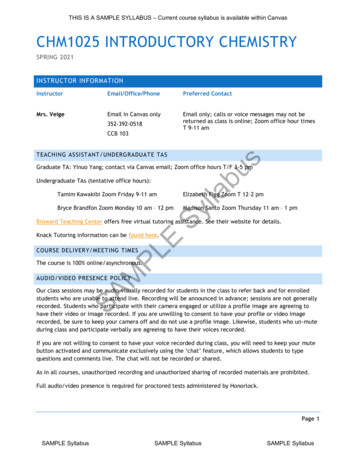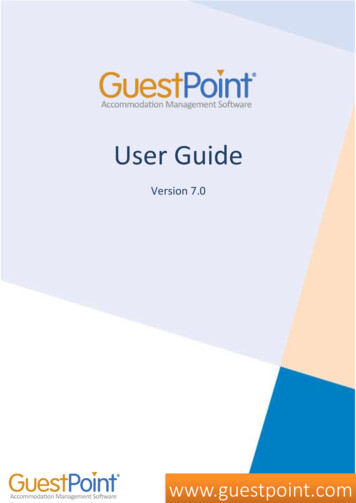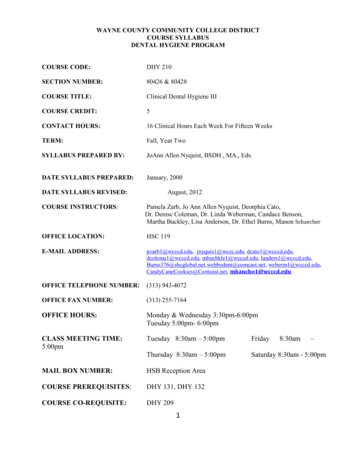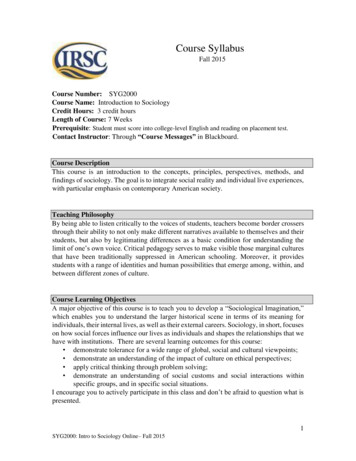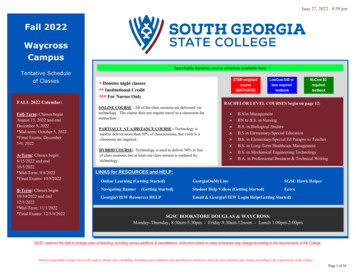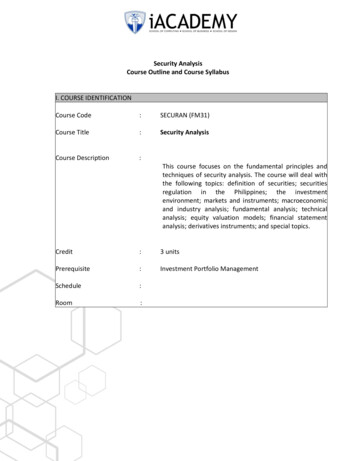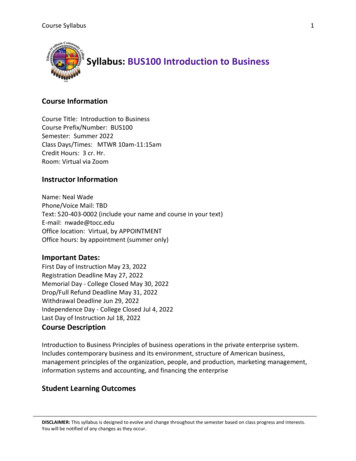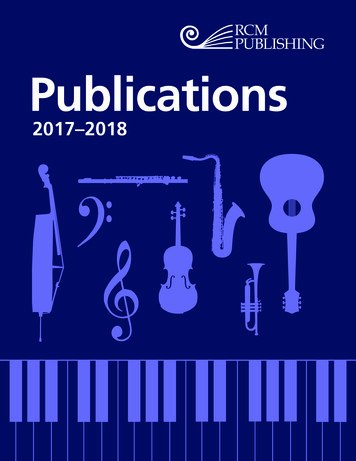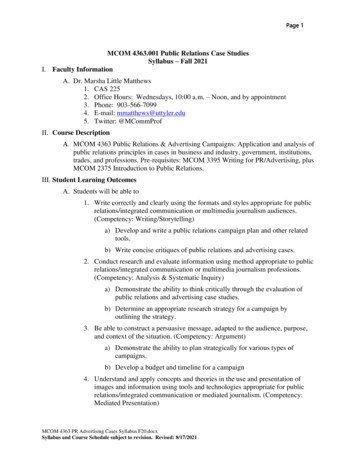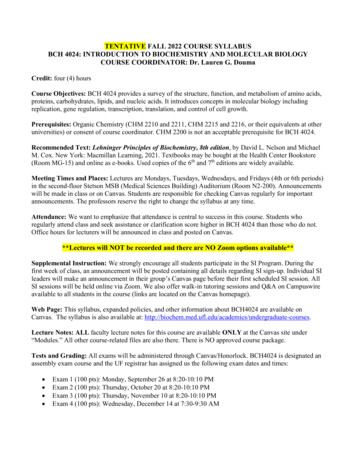
Transcription
TENTATIVE FALL 2022 COURSE SYLLABUSBCH 4024: INTRODUCTION TO BIOCHEMISTRY AND MOLECULAR BIOLOGYCOURSE COORDINATOR: Dr. Lauren G. DoumaCredit: four (4) hoursCourse Objectives: BCH 4024 provides a survey of the structure, function, and metabolism of amino acids,proteins, carbohydrates, lipids, and nucleic acids. It introduces concepts in molecular biology includingreplication, gene regulation, transcription, translation, and control of cell growth.Prerequisites: Organic Chemistry (CHM 2210 and 2211, CHM 2215 and 2216, or their equivalents at otheruniversities) or consent of course coordinator. CHM 2200 is not an acceptable prerequisite for BCH 4024.Recommended Text: Lehninger Principles of Biochemistry, 8th edition, by David L. Nelson and MichaelM. Cox. New York: Macmillan Learning, 2021. Textbooks may be bought at the Health Center Bookstore(Room MG-15) and online as e-books. Used copies of the 6th and 7th editions are widely available.Meeting Times and Places: Lectures are Mondays, Tuesdays, Wednesdays, and Fridays (4th or 6th periods)in the second-floor Stetson MSB (Medical Sciences Building) Auditorium (Room N2-200). Announcementswill be made in class or on Canvas. Students are responsible for checking Canvas regularly for importantannouncements. The professors reserve the right to change the syllabus at any time.Attendance: We want to emphasize that attendance is central to success in this course. Students whoregularly attend class and seek assistance or clarification score higher in BCH 4024 than those who do not.Office hours for lecturers will be announced in class and posted on Canvas.**Lectures will NOT be recorded and there are NO Zoom options available**Supplemental Instruction: We strongly encourage all students participate in the SI Program. During thefirst week of class, an announcement will be posted containing all details regarding SI sign-up. Individual SIleaders will make an announcement in their group’s Canvas page before their first scheduled SI session. AllSI sessions will be held online via Zoom. We also offer walk-in tutoring sessions and Q&A on Campuswireavailable to all students in the course (links are located on the Canvas homepage).Web Page: This syllabus, expanded policies, and other information about BCH4024 are available onCanvas. The syllabus is also available at: -courses.Lecture Notes: ALL faculty lecture notes for this course are available ONLY at the Canvas site under“Modules.” All other course-related files are also there. There is NO approved course package.Tests and Grading: All exams will be administered through Canvas/Honorlock. BCH4024 is designated anassembly exam course and the UF registrar has assigned us the following exam dates and times: Exam 1 (100 pts): Monday, September 26 at 8:20-10:10 PMExam 2 (100 pts): Thursday, October 20 at 8:20-10:10 PMExam 3 (100 pts): Thursday, November 10 at 8:20-10:10 PMExam 4 (100 pts): Wednesday, December 14 at 7:30-9:30 AM
The four, ninety-minute examinations are each worth 100 points, with a course total of 400 points. There willbe 50 multiple-choice questions on each exam. Students' final letter-grades will be determined solely basedon performance on exams. Exams will cover the material discussed in the lectures and presented onPowerPoint slides. There is NO EXTRA CREDIT. For more detailed information on grading see theBCH4024 Testing and Grading Policies in Canvas. Information on the UF grading policy is available s/grades-grading-policies/By agreement of the faculty, BCH4024 will NOT release exams for review. Be assured that exams undergo arigorous statistical review of every individual question. The faculty also consider student concerns voicedimmediately after exams. Adjustments to the answer key may occur and extra points will be awarded basedonly on the results of the faculty assessment. Dr. Douma is willing to review exam results with individualstudents who submit a request via email (LDouma@ufl.edu) within a week after the exam. Dr. Douma willNOT discuss if questions were "fair" and there is NO possibility of additional points once grades are posted.Honorlock: All BCH4024 exams will be administered using the Honorlocks Chrome ll). Honorlock will provide a scientific calculator. For all examsyou must use Chrome web browser, a computer that is connected to the internet, and a webcam (external orinternal) which can be turned to give a 360 view of your testing room. You are expected to take the exam ona computer that is HARD-WIRED to the internet to avoid loss of internet connection during the exam. Youmust be the only person present in your testing room. Two (2) pieces of scratch paper are permitted, but youmust show both sides of the empty scratch paper to the proctor during the 360 scan of your room.UF libraries have a limited number of rooms that can be reserved for exams: https://ufl.libcal.com/reserve/.Technical Issues: If you experience technical difficulties during an exam, contact Honorlock supportimmediately: https://honorlock.com/support/. Dr. Douma cannot help you with connection problems!Contact the UF Computing Help Desk at 352-392-4357 or via e-mail at helpdesk@ufl.edu.Make Up Exams: A make-up examination is available for students who miss ONE of the first three examswith the PRIOR PERMISSION of DR. DOUMA. Examples of valid reasons for missing an exam includeillness, injury, or some unforeseeable academic scheduling conflict. Vacations ARE NOT a valid excuse formissing an exam. Written documentation will be expected to support all makeup requests. All make-upexams are on Thursday, November 17 at 6:00-8:00 PM. Make-up exams are not cumulative and are designedfor equal difficulty. Students failing to take an exam will receive zero points for that test. No make-up examis available for Exam 4, so to complete BCH4024 students must take Exam 4 as scheduled.DRC Accommodations: Students requesting special-needs accommodation for testing must first registerwith the Dean of Students Office. The Dean of Students Office will provide documentation to the student.During the first two weeks of class, it is the student’s responsibility to provide this documentation toBIOCH-MAIL-BCH4024@mail.ufl.edu.Social Media: Students sharing course materials or information through any large social media site, such asGroupMe or Chegg, is strictly PROHIBITED. Establishing or participating in a site will be considered aviolation of the UF Honor Code. The Honor Code states, Section 3 Violations of the Student HonorCode Item 2, "Using any materials or resources, through any medium, which the Faculty has not givenexpress permission to use and that may confer an academic benefit to the Student." (page 13).
Course Communications: Faculty announcements are made through Canvas and students are responsiblefor staying up-to-date with all announcements. Dr. Douma will communicate with individuals using email toyour ufl.edu account. We cannot use gmail, yahoo, or any other email for official business. Questions aboutcourse organization, including exams and grades, should be directed to Dr. Douma via email (not telephone).Each lecturer is responsible for his/her own material. Lecturers will announce their office hour format whentheir section begins. Office hours will provide students the opportunity to ask questions directly to theprofessor regarding material presented in the lectures. Individual SI Groups will establish their owncommunication plans.BCH4024 Faculty:Dr. Lauren G. Douma, (“LGD”) and Course CoordinatorOffice: R3-254 ARBLDouma@ufl.edu or Lauren.Douma@medicine.ufl.edu (not Canvas email)DRC Accommodation Letters and Inquiries: BIOCH-MAIL-BCH4024@mail.ufl.eduDr. Robert McKenna (“RMK”)Office: LG-179 McKnight Brain Institutermckenna@ufl.eduDr. Daniel L. Purich (“DLP”)Office: R3-126 ARBdlpurich@ufl.eduDr. William L. Zeile (“WLZ”)Office: R3-206A ARBwzeile@ufl.eduIn-Class Recording: Students are allowed to record video or audio of class lectures (A class lecture doesNOT include assessments (quizzes, tests, exams), SI Sessions, private conversations between students in theclass or between a student and the faculty or lecturer during a class session). However, the purposes forwhich these recordings may be used are strictly controlled. The only allowable purposes are (1) for personaleducational use, (2) in connection with a complaint to the university, or (3) as evidence in, or in preparationfor, a criminal or civil proceeding. All other purposes are prohibited.Specifically, students may not publish recorded lectures without the written consent of the instructor.To “publish” means to share, transmit, circulate, distribute, or provide access to a recording, regardless offormat or medium, to another person (or persons), including but not limited to another student within thesame class section. Additionally, a recording, or transcript of a recording, is considered published if it isposted on or uploaded to, in whole or in part, any media platform, including but not limited to social media,book, magazine, newspaper, leaflet, or third party note/tutoring services. A student who publishes a lecturerecording without written consent may be subject to a civil cause of action instituted by a person injured bythe publication and/or discipline under UF Regulation 4.040 Student Honor Code and Student ConductCode.
Honor Code: UF students are bound by The Honor Pledge which states, “We, the members of theUniversity of Florida community, pledge to hold ourselves and our peers to the highest standards of honorand integrity by abiding by the Honor Code. On all work submitted for credit by students at the University ofFlorida, the following pledge is either required or implied: “On my honor, I have neither given nor receivedunauthorized aid in doing this assignment.” The Honor Code specifies behaviors that are in violation of thiscode and the possible sanctions. Furthermore, you are obligated to report any condition that facilitatesacademic misconduct. If you have any questions or concerns, please consult Dr. Douma.Course Evaluation: Students are expected to provide professional and respectful feedback on the quality ofinstruction in this course by completing course evaluations online via GatorEvals. Guidance on how to givefeedback in a professional and respectful manner is available at https://gatorevals.aa.ufl.edu/students/.Students will be notified when the evaluation period opens and can complete evaluations through the emailthey receive from GatorEvals, in their Canvas course menu under GatorEvals, or viahttps://ufl.bluera.com/ufl/. Summaries of course evaluation results are available to students mpus Resources:Health and Wellness: U Matter, We Care: If you or someone you know is in distress, please contact umatter@ufl.edu, 352392-1575, or visit U Matter, We Care website to refer or report a concern and a team member willreach out to the student in distress.Counseling and Wellness Center: Visit the Counseling and Wellness Center website or call 352392-1575 for information on crisis services as well as non-crisis services.Student Health Care Center: Call 352-392-1161 for 24/7 information to help you find the care youneed, or visit the Student Health Care Center website.University Police Department: Visit UF Police Department website or call 352-3921111 (or 9-1-1 for emergencies).UF Health Shands Emergency Room / Trauma Center: For immediate medical care call 352-7330111 or go to the emergency room at 1515 SW Archer Road, Gainesville, FL 32608; Visit the UFHealth Emergency Room and Trauma Center website.Academic Resources: E-learning technical support: Contact the UF Computing Help Desk at 352-392-4357 or via e-mailat helpdesk@ufl.edu.Career Connections Center: Reitz Union Suite 1300, 352-392-1601. Career assistance andcounseling services.Library Support: Various ways to receive assistance with respect to using the libraries or findingresources.
COURSE OUTLINE FORBCH 4024: INTRODUCTION TO BIOCHEMISTRY AND MOLECULAR BIOLOGYFall 2022LectureDateLecturerLecture Topic1W 8/24RMKBiological Organization2F 8/26RMKWater, Molecular Interactions, and Acid-Base Chemistry3M 8/29RMKAmino Acids4T 8/30RMKPeptides and Peptide Bonds5W 8/31RMKThree-Dimensional Structure of Proteins6F 9/2RMKProtein Dynamics and Protein FoldingM 9/5Labor Day (No Class)7T 9/6RMKProtein Separation and Purification8W 9/7RMKProtein Ligand Interactions9F 9/9RMKEnzyme Mechanism and Catalysis I10M 9/12RMKEnzyme Mechanism and Catalysis II11T 9/13RMKEnzyme Kinetics and Inhibition12W 9/14RMKEnzyme Regulation and Bioenergetics13F 9/16RMKCarbohydrates and Glycobiology14M 9/19DLPDigestion and Amino Acid Absorption15T 9/20DLPMobilization of Amino Acids16W 9/21DLPAmmonia Assimilation17F 9/23DLPUrea Cycle: Averting Ammonia Toxicity18M 9/26DLPBiosynthesis of Nonessential & Specialized Amino AcidsE1Monday, Sept. 26 at 8:20-10:10 PM19T 9/27DLPPyrimidine Nucleotide Biosynthesis20W 9/28DLPPurine Nucleotide Biosynthesis Salvage & DegradationEXAM 1[LECTURES 1 THRU 14]
21F 9/30DLPCatch up/Review22M 10/3WLZLipids23T 10/4WLZBiological Membranes24W 10/5WLZMembrane ProteinsF 10/7Homecoming (No Class)25M 10/10WLZMembrane Protein Transporters26T 10/11WLZMembrane Protein Signaling 127W 10/12WLZMembrane Protein Signaling 228F 10/14WLZIntroduction to Metabolism Part 229M 10/17WLZGlycolysis30T 10/18WLZGluconeogenesis31W 10/19WLZGlycogen MetabolismE2Thursday, Oct. 20 at 8:20-10:10 PM32F 10/21WLZRegulation of Carbohydrate Metabolism33M 10/24WLZCellular Respiration34T 10/25WLZThe Citric Acid Cycle35W 10/26WLZElectron Transport36F 10/28WLZOxidative Phosphorylation37M 10/31WLZIntroduction to Lipid Metabolism38T 11/1WLZKetones and Fatty Acid Synthesis39W 11/2WLZRegulation of Fatty Acid Metabolism40F 11/4WLZCholesterol Synthesis41M 11/7WLZPlasma Lipoproteins42T 11/8LGDDNA Structure and Genome Organization43W 11/9LGDDNA Replication IEXAM 2[LECTURES 15 THRU 28]
E3Thursday, Nov. 10 at 8:20-10:10 PMF 11/11EXAM 3[LECTURES 29 THRU 41]Veterans Day (No Class)44M 11/14LGDDNA Replication II45T 11/15LGDProkaryotic Transcription and Gene Regulation I46W 11/16LGDProkaryotic Transcription and Gene Regulation IIMAKE-UP Thursday, Nov. 17 at 6:00-8:00 PM Exams 1-3 MU (written permission by Dr. Douma only)47F 11/18LGDEukaryotic Transcription and Gene Regulation I48M 11/21LGDEukaryotic Transcription and Gene Regulation II49T 11/22LGDEukaryotic Transcription and Gene Regulation IIIW-F 11/23-11/25Thanksgiving Break (No Class)50M 11/28LGDPost-transcriptional RNA Processing51T 11/29LGDTranslation I52W 11/30LGDTranslation II53F 12/2LGDDNA Damage & Repair54M 12/5LGDSignal Transduction and Cell Cycle Control55T 12/6LGDCancer Biology I56W 12/7LGDCancer Biology IIE4Wednesday, Dec. 14 at 7:30 - 9:30 AMEXAM 4[LECTURES 42 THRU 56]
Course Communications: Faculty announcements are made through Canvas and students are responsible for staying up-to-date with all announcements. Dr. Douma will communicate with individuals using email to your ufl.edu account. We cannot use gmail, yahoo, or any other email for official business.

